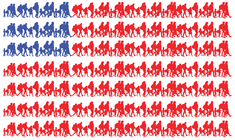|
The United States is a nation built on the creative strength of people born in other countries. John F. Kennedy discussed this in the posthumously published A Nation of Immigrants. He wrote: “In the community he had left, the immigrant usually had a fixed place. He could carry on his father’s craft or trade; he would farm his father’s land, or that small portion of it that was left to him after it was divided with his brothers. Only with the most exceptional talent and enterprise could he break out of the mold in which life had cast him. There was no such mold for him in the New World.
Once having broken with the past, except for sentimental ties and cultural inheritance, he had to rely on his own abilities. It was the future and not the past to which he was compelled to address himself.” Later on, Kennedy describes how immigrants’ inventiveness is the force that helped make the United States into a world leader in its politics and economy. Though these days immigrants face a wave of rejection, many Americans still value the contributions of those who came from other lands, and want to show their solidarity. But they do not always know the way to do it. As immigrants, we thank them for their concern, and to make their helping hands more effective we suggest the following guidelines: 1. Get to know us. By doing this you will see what is the best way to contribute to our communities. As immigrants we have another culture; often another religion; our families and our societies may be organized differently. We are neither better nor worse. We are different. Much confusion may arise from this difference. There are some non-immigrants who think that what is good for them is good for us, and it is not always so. 2. Let us learn. As difficult as it is to navigate a country other than that of our birth, immigrants must learn to do so. We must plan our lives and learn to build our dreams, and the only way we can learn is by doing so. A guide showing us how to navigate our challenges might be very welcome. However, we need to be the masters of our fate. 3. Understand that, in addition to the natural problems of life, many members of our community have immigration difficulties that make them more vulnerable. Learning more about the immigration process may help you empathize with someone’s situation. When faced with a problem, an immigrant may feel more alone than someone who was born and has lived in the country since birth. Before engaging immigrants in political causes, please be responsible and think about how much they might have to lose. 4. Let us share our culture with you. When immigrants use the traditional dresses of our countries, we are not wearing mere costumes. Our traditions carry a legacy of knowledge that makes us who we are today. We follow religious or civic ceremonies from our countries of origin because they are part of our history. By practicing them, we honor our ancestors and give continuity to their legacy. 5. The best way to support immigrants is through simple, day-to-day acts in which we help one another grow. Weaving a society in which we each have a place is the responsibility of us all. |

